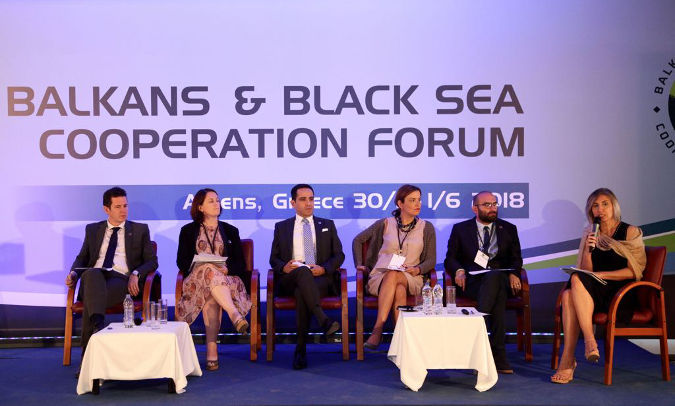UN Women calls on companies to sign the Women’s Empowerment Principles at the Balkans and Black Sea Cooperation Forum
Date:

From 30 May to 1 June, Balkans and Black Sea Cooperation Forum (BBSCF) brought together high-level audience from the public, business and diplomatic world in Athens, Greece to foster cooperation, business relations and sustainable growth across the Central and Eastern Europe, South-east Europe and Black Sea regions and beyond.
Organized by Geo Routes in partnership with UN Women, Organization of the Black Sea Economic Cooperation (OBSEC) and Black Sea Trade and Development Bank, the Forum is an international rotating economic conference aimed at highlighting cross-border cooperation and promoting sustainable development across entire Balkans and Black Sea region.
This year UN Women contributed to the Forum by organizing the panel “How can the private sector advance gender equality and women’s empowerment?” with an objective to raise awareness among the participants about Women’s Empowerment Principles (WEPs) – a roadmap for the private sector to promote gender equality in the workplace, marketplace and community – and encourage more companies in the Balkans and the Black Sea regions to sign the WEPs.
The session, moderated by UN Women’s WEPs Policy Specialist Meral Guzel, showcased commitments, experiences and good practices of private sector companies, NGOs and business networks to advance the gender agenda.
David Gorgiladze, Head of Public Relations and Corporate Social Responsibility at M2 Real Estate in Georgia, presented the development of their company-wide gender-agenda after signing the WEPs in 2016. The company developed a seven-point action plan; including collection of sex-disaggregated data, establishing an internal and external complaint system, organizing leadership training for women, employing women to the positions traditionally regarded as “men’s jobs”, and regularly reporting and engaging in active communication about the WEPs. “Women’s empowerment by private sector companies is not a trendy step or a goodwill. This is a very pragmatic way, according to which business becomes more efficient and financially more successful,” said Mr. Gorgiladze.
“Achieving diversity is not only a women’s issue and it is not an act to tick the box! Diversity and inclusivity are critical economic and business issues,” said Rania Ekaterinari, CEO of Hellenic Corporation of Assets &Participation. She explained how accelerating the clock towards gender parity in her company required combined efforts by all key stakeholders, together with taking ownership and becoming active sponsors at multiple levels.
Bora Tuncer, Schneider Electric Cluster President of Turkey-Iran & Central Asia, pointed out their Gender Diversity and Inclusion Agenda where equal opportunities are provided to every employee. Through their gender-sensitive recruitment and career policies, mentoring programme for women students, global family leave policy and community engagement to prevent violence against women, Schneider Electric received several international prizes for their efforts in advancing gender agenda. “Schneider Electric aims equal opportunities and equal pay for everyone, everywhere. We value diversity and building a culture of inclusion. We’re committed to having more women on our workforce, because diversity makes Schneider Electric a great company,” said Mr. Tuncer.
Paula Byrne, Business Development Director of CSR Europe, addressed women’s empowerment at work as key to shaping the skills for Future of Work and central to business development.
Arda Batu, Secretary General of Turkish Business Confederation TURKONFED, spoke about the Confederation efforts to promote gender equality and support the WEPs within their corporate policies by creating an awareness on the Principles among small and medium-sized enterprises.
“Diversity and inclusion are our core values. BBSCF strongly endorses the Women’s Empowerment Principles and we make a call to all companies in the Balkan and Black Sea region to adopt the Principles” said Giannis Balakakis, President of the BoD Geo Routes Cultural Institute & Chair Organizing Committee BBSF.
The WEPs point to best practices through seven principles that guide businesses on how to empower women in the workplace, marketplace and community. Through the WEPs agenda, UN Women targets to empower women to participate fully in economic life across all sectors and throughout all sectors of economic activity. Currently there are about 363 WEPs signatories in the Balkan and Black Sea region, with Turkey leading with 273 companies.
The Final Declaration of the Forum encouraged all organizations and companies in the region to adopt and integrate the WEPs.